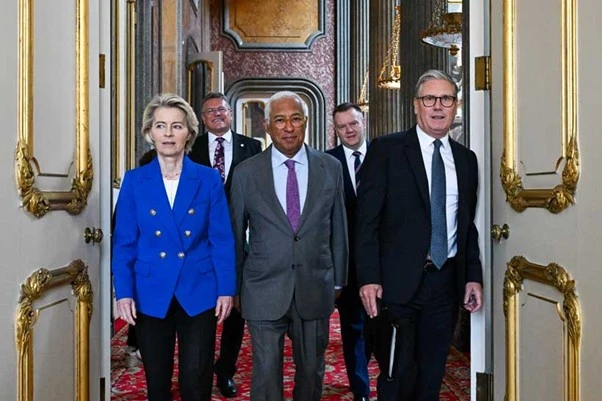The European Union’s proposal for a specialized tribunal to adjudicate acts of aggression perpetrated during the Russian incursion into Ukraine has ignited a fervent discourse. Although celebrated by several advocates as an essential advancement in international justice, others contend that it signifies a victory of idealism over practicality. The proposed tribunal seeks to tackle the fundamental crime of aggression, an infraction for which the International Criminal Court (ICC) have jurisdiction only under certain conditions. The EU project, albeit commendable in its aims, prompts significant inquiries about practicality, impartiality, and the wider ramifications for international law and diplomacy.
The special tribunal idea fundamentally embodies the EU’s commitment to maintaining the international rule of law. The EU aims to make Russia’s leadership responsible for the unprovoked invasion of Ukraine by addressing the crime of aggression. In contrast to war crimes or crimes against humanity, which may be tried irrespective of the perpetrator’s nationality or the victim state’s agreement, the crime of aggression occupies a more intricate legal and political Gray area. The ICC may pursue violence under the Rome Statute only if both the aggressor and the victim state are signatories or have consented to its jurisdiction.
Russia is not a signatory and has not acknowledged ICC jurisdiction on this offense. This legal gap essentially shields Russia’s senior leadership from punishment under current systems, prompting the EU’s demand for a specialized tribunal.
This action, however, symbolizes a profound conflict in international law: the pursuit of justice vs the constraints of realpolitik. The concept of holding influential nations or their leaders responsible for waging war is morally justified and aligns with the post-World War II ethos that led to the establishment of the Nuremberg Trials. However, implementing such accountability in the contemporary multipolar world is replete with difficulties.
Absent the endorsement of the United Nations Security Council, where Russia has veto power, the tribunal is improbable to achieve universal legitimacy. Support is not consistent even throughout Europe. Certain nations express concern over the establishment of a precedent that may ultimately be used against them. Some individuals dispute the efficacy of symbolic prosecutions in deterring violence or altering state conduct.
Moreover, the EU’s plan for a separate tribunal has significant challenges with enforcement. International tribunals rely on state assistance for the apprehension of suspects, collection of evidence, and enforcement of sentences. Cooperation in a tribunal aimed against high-ranking Russian officials, perhaps including President Vladimir Putin, seems improbable. Russia has shown disobedience against international legal initiatives, repudiating ICC arrest orders and disregarding global censure. The tribunal risks becoming a mere symbolic gesture, eloquent in discourse but ineffective in practice.
Critics contend that the tribunal might potentially weaken established international legal institutions. By circumventing the ICC, the EU may be seen as fostering legal fragmentation, establishing ad hoc entities that undermine the authority of the global court. The ICC’s shortcomings are evident, especially regarding the crime of aggression; the establishment of competing bodies may undermine the unity of international criminal law.
Furthermore, several countries, especially in the Global South, see these courts as instruments of Western dominance, used selectively and disproportionately against non-Western nations. Such impressions may exacerbate tensions and undermine the global consensus over the rules-based international order that the EU purports to uphold.
Proponents of the tribunal believe that its presence may function as a potent symbol. In an era marked by the ascendance of authoritarianism and the frequent invocation of national sovereignty to obscure human rights violations, the special tribunal signifies a reaffirmation of ethical principles. It contends that wars of aggression are not only political misjudgements but crimes deserving of punishment.
Regardless of whether Russian officials face justice, the tribunal may assist in documenting crimes, preserving historical documents, and preventing Moscow from uncontested narrative revisionism. In this context, idealism is not inherently antagonistic to realism; it may represent a mode of long-term strategic contemplation.
The special tribunal may influence future international law by clarifying terminology, methods, and precedents related to the crime of aggression. Similar to how the Nuremberg Trials established the foundation for contemporary international criminal law, the EU’s effort may stimulate changes inside the ICC or motivate other regional entities to enhance their accountability frameworks. It indicates to potential aggressors that the world community is prepared to take action, despite legal and practical challenges.
The EU’s special tribunal represents both a bold assertion and a precarious wager. It encapsulates the conflict between reality and idealist. It advocates for a conception of justice that surpasses power dynamics. Conversely, it functions within a geopolitical landscape where ideals often clash with stark reality. The legacy of this initiative as a landmark in international justice or a misguided endeavour will primarily depend on its implementation, the extent of international backing it receives, and the changing political context.
Ultimately, the tribunal’s significance may reside not in prompt prosecutions but in its capacity to sustain the notion of responsibility. It serves as a moral compass during tumultuous periods, reminding us that even the most formidable nations are subject to the law. In this regard, idealism may not represent a deficiency but rather an essential impetus to expand the limits of realism and potentially, bring the world nearer to a more equitable order.








